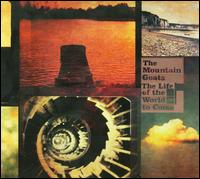
The Mountain Goats
The Life of the World to Come
(4AD; 2009)
By Andrew Hall | 13 October 2009
As the first decade of the 2000s comes to a close, it’s clear that as a singer-songwriter who predominantly plays acoustic guitar, and as a musician once bound to a specific method of presentation—accompanied by the endless drone of a boombox’s grinding gears, to superfans who have gone so far as to identify the fact that those gears resonate as an “A9 #11 with both a dominant and major 7 with an E in the bass“—John Darnielle has done a remarkable job of making a name for himself. Since signing to 4AD and casting that boombox aside, likely permanently, he’s delivered six proper full-lengths, each pushing his songs in different directions. Darnielle used new collaborators and production styles to enhance his explorations of specific themes and autobiography, as exemplified by the stark contrasts of the ambitious arrangements on The Sunset Tree when compared to how spare Get Lonely (2006) sounds, or how aggressive Heretic Pride (2008) is.
The Life of the World To Come marks a number of changes. Gone are both longtime producer John Vanderslice and cellist Erik Friedlander; in their place, Darnielle enlists Owen Pallett for string arrangements and several producers (Brandon Eggleston, John Congleton, and Scott Solter), two of them new. Unlike the comparatively raucous Heretic Pride—which came as a relief after three harrowing, at least partially autobiographical records about drugs, abuse, and one’s gradual disconnect from everything and everyone around them—The Life pushes deeper into the territory of last year’s Satanic Messiah and Black Pear Tree EPs. Many of the songs are somber, subdued, and about how believers confront death and the afterlife.
Most immediately there’s the fact that every song on The Life is named after a bible verse. That “1 Samuel 15:23” opens with the line “I became a crystal healer and my ministry was to the sick” probably encourages an easy reading of this as a contemporary Christian record, which it isn’t. Darnielle has explained that this isn’t a record about a spiritual reawakening, rather “twelve hard lessons the Bible taught [him], kind of,” the verses clearly influencing the material. “Genesis 3:23,” about banishment from the Garden of Eden, sees Darnielle’s narrator break into a forbidden space, repeating in the chorus that he used to live there. “Psalms 40:2” goes so far as to quote the verse in its chorus, but the song is an apocalyptic travel narrative, what with this being the Mountain Goats and not an actual Christian rock act.
The believers Darnielle writes about really aren’t a whole lot different from the drug addicts, failed lovers, and psychotics he’s been singing of all these years, but presenting twelve of them, each fixated on higher powers, makes these songs all the more fascinating. “1 John 4:16” is a song of devotion from a narrator about to be eaten by a lion who can’t stop thinking about an unknown addressee as it rains, the narrator’s optimism raising questions as to whether this addressee could possibly be a real person. In “Isaiah 45:23” his believer uses devotion as an out as his body fails him, and “Philippians 3:20-21” creates a disconnect between someone’s death and their supposed afterlife—Darnielle repeats that “nice people say he had gone home to God now,” but his angels consist exclusively of “smoke alarms.”
There’s also the business of instrumentation. Wurster’s percussion proves far more atmospheric on these songs; consider the tom-heavy “Hebrews 11:40” and the cymbal crescendo that comes between the verses of the almost-drumless “Genesis 30:3.” Closer “Ezekiel 7 and the Permanent Efficacy of Grace” is underpinned only by a single drum occasionally repeating two hits and a cymbal’s drone, sounding almost like a heartbeat as the song ends. Pallett’s strings are largely ornamental, never driving songs the way Friedlander’s cello did, though they give a number of songs needed weight and make them a whole lot more interesting in moments where they could otherwise drag. Part of this is because Darnielle’s lead instrument is piano across a third of the disc; unlike his often-percussive guitar playing, his piano work is chord-driven but sparse, and it turns songs like “Deuteronomy 2:10,” about extinction, both quieter and far more unnerving.
Then there’s “Matthew 25:21,” the longest Mountain Goats song ever released. Darnielle has called it straight autobiography, a recounting of watching his mother-in-law as she died of cancer. Whereas We Shall All Be Healed (2004) and The Sunset Tree (2005) were rooted in his past, there’s something else happening here, save for moments in which he describes his inability to prepare himself: his language is entirely straightforward and plainspoken. It stands strangely alongside Darnielle’s songs of death, murder, lack of control, devotion, and skepticism, with no clear point of comparison anywhere else in the Goats’ history. Hearing him reduced to such a simple, prolonged presentation turns utterly devastating, and its effect is undeniable.
Darnielle’s great strength is in his ability to turn material that could easily become infuriating in anyone else’s hands—both in concept and execution—into something compelling and unique. Regardless of his collaborators or how he chooses to approach his songs, The Life of the World to Come is further proof of Darnielle’s ability, evident since long before he traded a boombox for a studio, to imbue his imagery, his sentiments, and his many characters with astounding weight and power.





